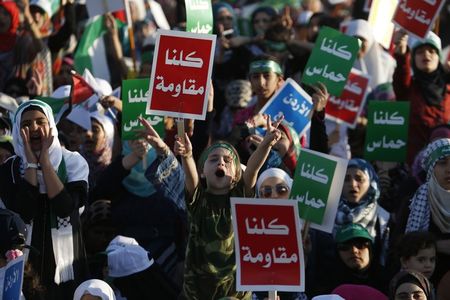By Shadi Bushra
CAIRO (Reuters) - Some senior figures in Egypt's outlawed Muslim Brotherhood have agreed to leave Qatar, a prominent member of the group said on Saturday, following months of pressure on the Gulf Arab state from its neighbours to stop backing the Islamist group.
"To lift the embarrassment for the state of Qatar, which we found hospitable, some of the symbols of the Muslim Brotherhood who have been asked to move their residency outside the state have agreed," senior Brotherhood figure Amr Darrag said on his Facebook page.
Qatari officials were not immediately available for comment. Egyptian newspapers reported on Saturday that Qatar had asked seven senior members of the Brotherhood to leave the country within a week.
Darrag did not say whether he would leave Qatar, whose ties with regional states were strained after it hosted prominent members of the Brotherhood.
Saudi Arabia, the United Arab Emirates and other Gulf Arab states see the Muslim Brotherhood as an existential threat to the monarchies.
They have showered Egypt with billions of dollars since its army toppled President Mohamed Mursi of the Muslim Brotherhood last year following mass protests against his rule.
Ties between Qatar and Egypt were badly damaged after Mursi's fall. Qatar has welcomed a number of senior Brotherhood figures since Egyptian security forces launched a crackdown on the movement, killing hundreds in the streets and arresting thousands of others.
Egypt has declared the Brotherhood a terrorist movement. The Brotherhood says it is a peaceful group.
The spokesman for Egypt's foreign ministry said he had "no idea" if Qatar had expelled Brotherhood leaders, and declined to comment further until Cairo had examined the issue.
KERRY IN CAIRO ON MIDEAST TOUR
The tensions between Qatar and its neighbours caused Saudi Arabia, Bahrain and the United Arab Emirates to withdraw their ambassadors from Doha in March.
Qatar has also been courted by the United States to support U.S.-led action against Islamic State militants who control parts of Iraq and Syria.
U.S. Secretary of State John Kerry won backing on Thursday for a "coordinated military campaign" against Islamic State from 10 Arab countries - Egypt, Iraq, Jordan, Lebanon and six Gulf states including Saudi Arabia and Qatar.
Lebanese Foreign Minister Gebran Bassil told Reuters some Arab states at talks in Jeddah on Thursday had proposed expanding the campaign to fight other Islamist groups besides Islamic State. That could include the Muslim Brotherhood.
Kerry arrived in Cairo on Saturday for talks with senior government officials.
Egypt would certainly welcome any moves that would further isolate the Muslim Brotherhood, many of whose leaders are on trial in Cairo and could face the death penalty.
Wagdy Ghoneim, a cleric who supports the Muslim Brotherhood, said he was leaving Qatar.

"Thanks to Allah, I have decided to move from dear Qatar, without any pressure or difficulties or problems," he said in a video on his Facebook page.
(Reporting by Shadi Bushra; Editing by Michael Georgy and Mark Potter)
